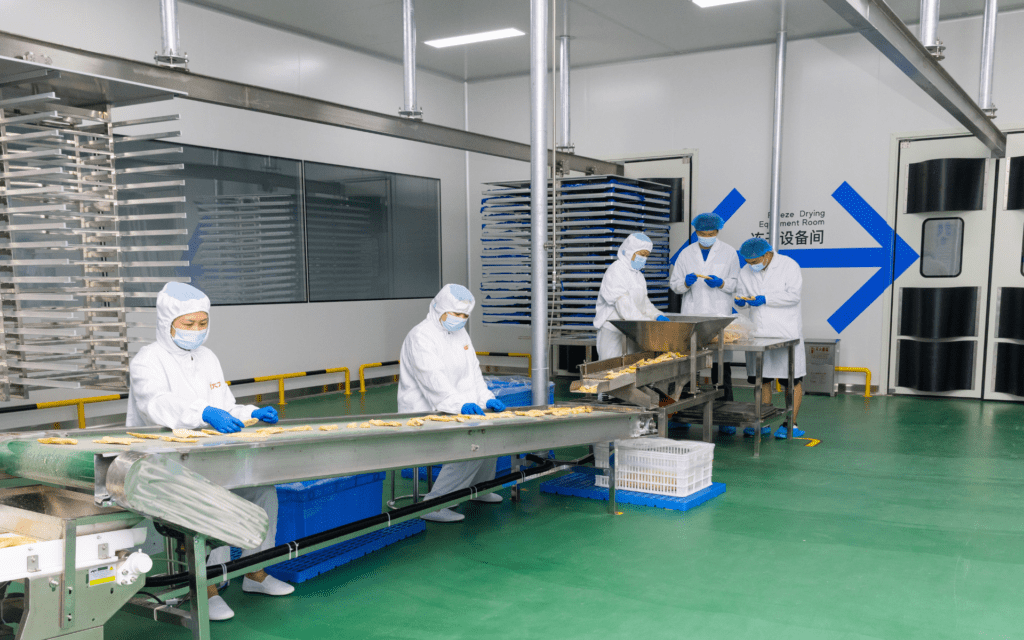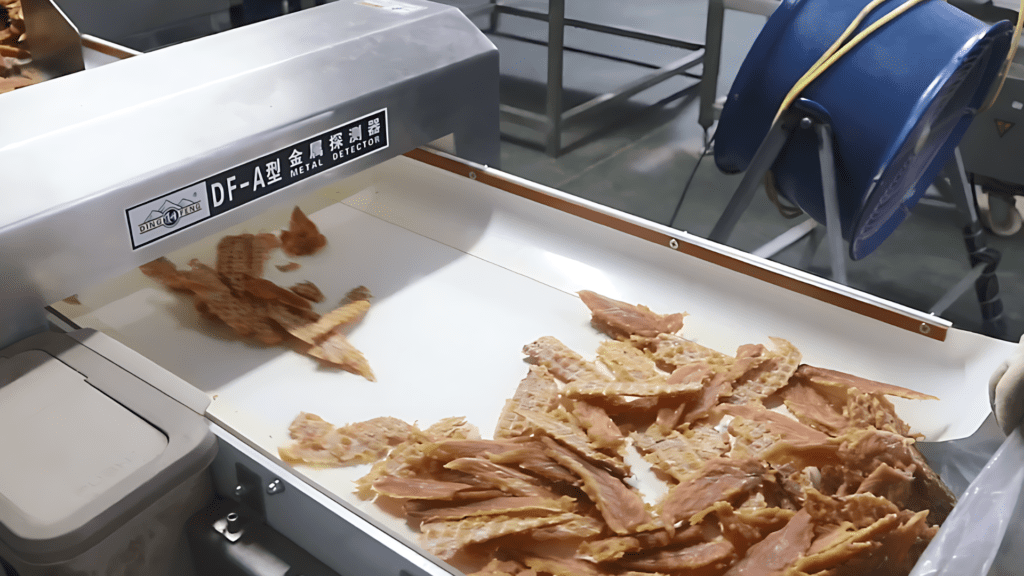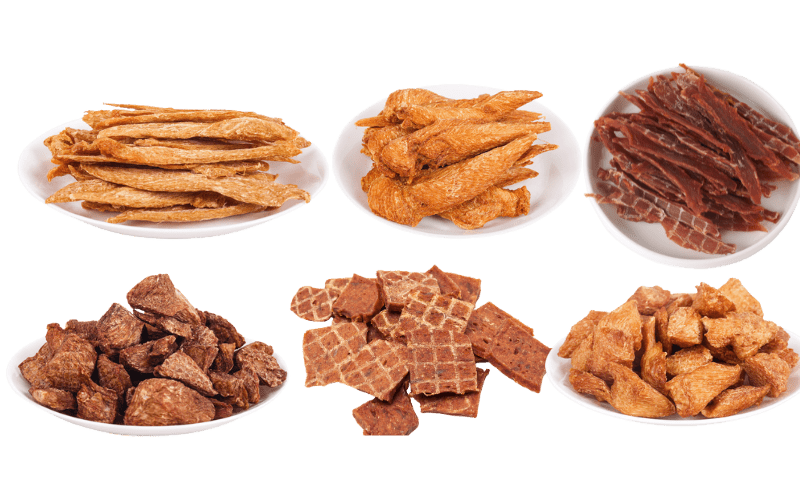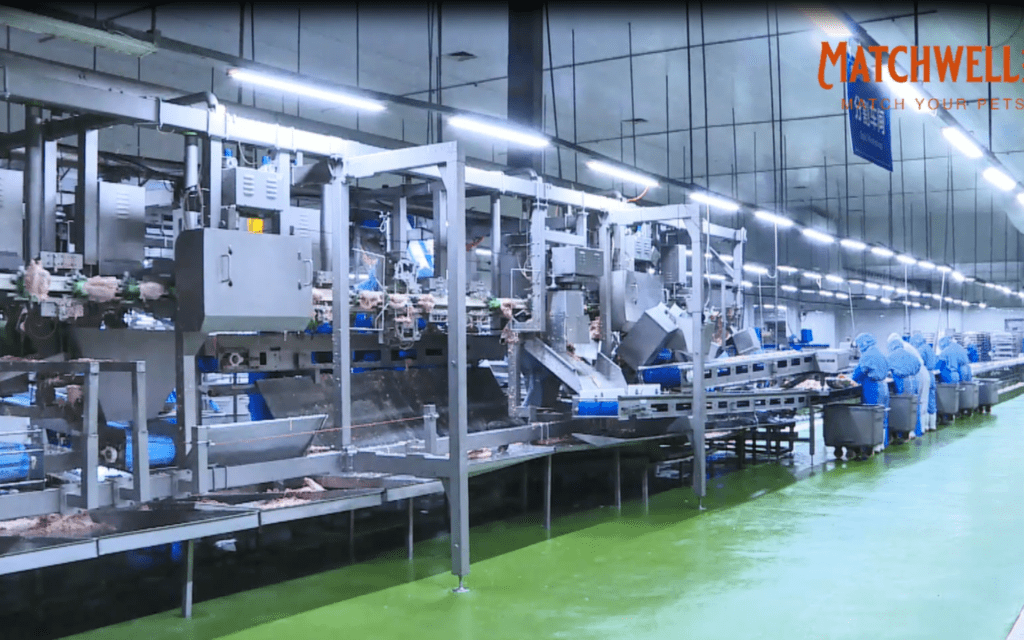Pet food manufacturing is a rapidly evolving industry that has witnessed significant changes in recent years. With the global pet care market growing at an accelerated pace, it’s essential for wholesalers, retailers, and manufacturers to stay ahead of trends to meet the demands of pet owners. As a pet treats manufacturer with years of experience in the industry, Matchwell Pets is perfectly positioned to provide insights on what is driving innovation and growth in the sector.
In this blog, we’ll explore the latest trends in pet food manufacturing, challenges that manufacturers face, and how wholesalers can benefit from these insights to grow their businesses. Whether you are an online retailer, a large supermarket, or an OEM/ODM customer looking for customized pet treats, this blog will provide valuable information to help you make informed decisions.

1. The Growing Pet Food Market: Key Statistics
The global pet food industry is experiencing remarkable growth, with the market size expected to reach USD 59.49 billion by 2025, growing at a CAGR of 5.2% from 2020 to 2025. The increase in pet ownership, especially among younger demographics and urban dwellers, is a key driver of this growth. As of 2023, it is estimated that over 60% of households in the U.S. own a pet, with a significant proportion of those pet owners willing to invest in high-quality, premium pet food products.
In China, pet food manufacturing is also gaining momentum. The market is expected to grow by nearly 10% annually, driven by increasing disposable incomes, a rise in pet adoption, and greater awareness of pet health. The rise of e-commerce platforms like Tmall and JD.com further fuels the demand for diverse and high-quality pet food options.

Key Takeaway: The pet food market is booming, and the demand for high-quality, sustainable, and innovative pet food products is higher than ever. Wholesalers and pet food manufacturers must stay ahead of these trends to meet market expectations.
2. Shifting Consumer Preferences: What Pet Owners Want
The landscape of pet food is rapidly evolving. Pet owners today are more informed, more conscientious, and more invested in the well-being of their animals than ever before. Understanding these changing preferences is crucial for any pet food manufacturer, particularly for wholesalers and retailers looking to stock in-demand products.

Health-Conscious Pet Owners
As human food trends increasingly emphasize health and wellness, pet owners are applying the same criteria to their pets’ food. A rising trend in pet food manufacturing is the demand for natural, organic ingredients. Pet parents are actively looking for foods with no artificial preservatives, colors, or fillers. The focus on grain-free and high-protein formulas is growing, especially among dog owners.
Pet Treats with a Purpose
Pet treats, in particular, have become a huge growth area. Pet owners are looking for functional treats—products that go beyond simple indulgence. These include treats that support specific health benefits, such as dental health, joint health, and digestive support.

Ethical and Sustainable Choices
Sustainability is no longer optional for pet food manufacturers. A growing segment of consumers wants to ensure that the food their pets consume is ethically sourced. Whether it’s plant-based ingredients, humanely raised meats, or eco-friendly packaging, manufacturers are pivoting toward sustainable practices to appeal to these conscientious buyers.
Key Takeaway: The demand for healthy, functional, and sustainable pet food options is rapidly growing. Wholesalers and retailers must cater to these preferences to stay competitive in the market.
3. Emerging Trends in Pet Food Manufacturing
Pet food manufacturers must stay ahead of emerging trends to remain competitive. Here are some of the most exciting developments that are shaping the future of pet food.

Sustainable Sourcing
Sustainability is increasingly important to consumers, especially younger pet owners. Manufacturers are responding by sourcing locally grown, organic ingredients and minimizing the environmental impact of their production processes. For example, plant-based pet foods are gaining popularity as they offer an eco-friendly alternative to traditional meat-based products.
Customization and Personalization
Personalization is another rising trend. Pet food manufacturers are increasingly offering customized formulations tailored to the specific needs of individual pets. Whether it’s based on breed, size, age, or health condition, customized pet food is becoming a major selling point for pet food manufacturers. Subscription services that offer personalized pet food plans are also growing in popularity.

Health-Focused Formulas
Health is a central concern for many pet owners. In response, manufacturers are creating more specialty diets, including formulas for pets with food allergies, sensitive stomachs, or chronic conditions. Furthermore, the demand for high-protein and low-carb diets for pets is on the rise, with many pet owners viewing these as a way to promote longevity and overall wellness.
Pet Treat Innovation
Pet treats are an essential segment of the pet food market. Innovation in pet treats is thriving, with manufacturers introducing unique flavors, textures, and health benefits. For instance, freeze-dried dog treats and grain-free alternatives are quickly becoming consumer favorites. Additionally, functional treats that promote dental hygiene, skin health, and digestion are seeing growth in both the dog and cat treat markets.
4. The Role of Technology in Pet Food Manufacturing
Technology is playing an increasingly vital role in the pet food industry. From improved production processes to new innovations in quality control, pet food manufacturers are adopting cutting-edge technologies to stay ahead of consumer demand.

- Automation and AI are being used to improve efficiency and consistency in production lines.
- Blockchain technology is being explored to ensure traceability and transparency in ingredient sourcing.
- 3D printing is enabling manufacturers to create custom shapes and sizes for treats, ensuring consistency and unique product offerings.
These technologies help improve product quality, reduce waste, and enhance the speed to market.
5. Challenges in the Pet Food Manufacturing Industry
While the pet food market presents numerous opportunities, there are several challenges that manufacturers must address:
- Ingredient Sourcing: With an increasing demand for high-quality, sustainable ingredients, securing the best sources can sometimes lead to price volatility.
- Regulatory Compliance: Different regions have varying regulations regarding pet food production, making compliance a complex task.
- Rising Raw Material Costs: As demand for organic and premium ingredients rises, the cost of raw materials can become a challenge, impacting profitability.

6. Opportunities for Wholesalers and Retailers
For wholesalers and retailers, this dynamic environment presents several opportunities:
- Expand Product Offerings: Incorporating popular trends like grain-free, natural, and functional treats can differentiate your product lineup.
- Partnerships with Manufacturers: Collaborating with established pet food manufacturers to offer private label pet treats or white-label dog treats can give wholesalers access to a larger market share.
- Online Sales Channels: With pet owners increasingly shopping online, wholesalers should focus on building their online presence through e-commerce platforms.
7. Why Quality Control and Certification Matter
Quality control is critical in the pet food manufacturing process. Certifications such as BRC, IFS, and Food Safety Certification are key indicators of a manufacturer’s commitment to product safety and quality. These certifications ensure that manufacturers follow rigorous standards, including proper handling, ingredient sourcing, and testing for contaminants.

8. How Matchwell Pets Can Help You Stay Ahead
At Matchwell Pets, we understand the evolving landscape of the pet food industry. As a leading manufacturer of wholesale pet treats, we offer a wide range of high-quality products to meet the demands of wholesalers and retailers. Whether you’re looking for private label pet treats, white-label dog treats, or customized formulations, we can support your needs with flexible OEM/ODM solutions.
Visit Matchwellpets to explore our products and learn how we can help your business grow in the competitive pet food market.
9. Conclusion
The pet food manufacturing industry is booming, driven by increasing pet ownership, changing consumer preferences, and innovations in pet food production. By staying ahead of these trends and leveraging technology, wholesalers and retailers can tap into the growing demand for high-quality, functional, and sustainable pet food products.
For those looking to source quality pet treats, Matchwell Pets provides tailored solutions to meet the diverse needs of businesses in this thriving market.




